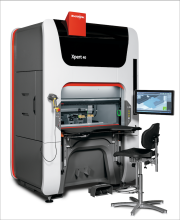Can’t find a standard enclosure to meet your exacting requirements? Specifying a bespoke solution may be the best option. Besides functional benefits, bespoke may invest competitive edge and set your project apart from others in the market, explains ICEE’s Chris Arnold. And with today’s rapid prototyping methods, you can have one-off or batch production quickly and affordably
What’s the brief from your boss? Usually it will be dominated by one fundamental priority – transform the design concept into a practical and high quality product, and bring it to market in the quickest and most affordable way possible.
If the project requires an enclosure you may start by looking for a standard product. In other cases, for marketing purposes, you may be required to come up with a solution that is completely unique. In practical terms, opting for a bespoke solution means you don’t have to compromise the way you often have to with a standard offering. It can be designed to deliver exactly what the product requirements specification demands.
Take the case of electrical, telecommunications and transport control systems. Designed to be compliant with technical standards, a bespoke option enables internal space to be provided that will accommodate all components and leave room for masses of cabling, ease of service access, and support equipment such as cooling fans and air-conditioning, or sound-proofing. Or the customer may want a non-standard outcome because the enclosure has to stand out and be distinctive in the marketplace. Such as promoting a new and innovative nationwide folding bike hire scheme. Or a high quality food or drink product that has hitherto been unavailable through automated, 24/7 vending machines.
 Bespoke contractor solutions
Bespoke contractor solutions
Many organisations may possess the design capability but lack fabrication facilities. Perhaps a challenging design means the development workshop lacks a suitably high performance fibre laser cutting machine, a super-accurate brake press, or the necessary high quality welding and finishing facilities. Out on the production floor there may not be the flexibility or capacity to fit in the iterative demands of prototyping and development, or accommodate a one-off, or make low volume batches.
Another common reaction to bespoke is, it’s too expensive and takes far too long. The answer here is find an external manufacturing services contractor set up for this process. These companies are generally lean and responsive businesses geared to developing a design through the rigours of prototype and development, into production.
Invariably, smart technology is employed to do this – including 3D computer-aided design (CAD) and integrated computer numerical control (CNC) production machinery. Prototypes and one-offs may be made in hours, not days – and to the quality the customer has specified. Another advantage is these companies are usually relatively local, so you are not dealing with a supply chain thousands of miles long, plus shipping delays. All the work may be done under one roof, so transport – and carbon emissions – are minimised.
The key phrase is rapid prototyping. For example, take a process like press brake folding. To save costs and increase productivity still further, machines now exist that are relatively small, agile and lean (see picture). This type of CNC equipment is often mobile, so it can be moved anywhere within a plant and linked into the digital network. It can make parts in a local work cell or augment other press brake or lean manufacture processes.
Linked to a CAD system, or operated standalone, its range of functions, flexibility and capability to produce large and small parts efficiently makes it ideal for making prototypes rapidly, as well as production quantities. It also encourages experiment. Don’t forget, much may be gained by spending time with an operator of such a user-friendly machine, trying different options, either to reduce costs or simply explore design possibilities.
 Companies that manufacture bespoke enclosures based on this approach are a valuable source of advice. Call and talk through your project. Use their considerable experience and knowledge to cut time and cost. A good contractor will listen carefully, suggest constructive ideas and be prepared to try new approaches.
Companies that manufacture bespoke enclosures based on this approach are a valuable source of advice. Call and talk through your project. Use their considerable experience and knowledge to cut time and cost. A good contractor will listen carefully, suggest constructive ideas and be prepared to try new approaches.
In short, before you settle for a standard product that demands a lot of compromise, take a look at how much better a bespoke – and today far more affordable and rapidly produced – option will meet your requirements. It may protect better, last longer, be easier to install and maintain, and generally perform more cost-effectively in the long run. Plus, as a bespoke and uniquely branded design, it may also set your product – or your client’s product – way above the rest of the market.

